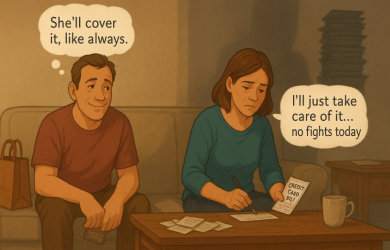7 Tips to Stop Parenting Your Partner and Why It’s Important

Unlock Daily 30-Sec Tips for a Happier Relationship
👉 Subscribe FREEKey Takeaways
Marriage.com AI Quick Summary
Parenting your partner can be a common challenge in many relationships. However, parenting your partner can inadvertently lead to strained relationships, resentment, and communication breakdowns.
It’s essential to recognize the fine line between being supportive and becoming overly controlling. So, let’s explore seven invaluable tips to help you stop parenting your partner and nurture a healthier dynamic.
Whether you’re a parent or simply trying to improve your relationship, these insights will empower you to create a more equitable and harmonious partnership where both individuals can thrive independently while still offering support to one another.
What does it mean to parent your partner?
Parenting your partner refers to a dynamic within a romantic relationship where one person takes on a parental role, often unintentionally, toward their significant other.
The behavior can manifest in various ways, and while it may stem from a place of care or concern, it can have detrimental effects on the relationship. So, while gentle parenting your boyfriend or girlfriend can be fine, sometimes, if it becomes a habit, it can cause various problems.
Here are some common aspects of parenting your partner:
- Overprotectiveness: The “parenting” partner may constantly worry about their significant other’s safety, well-being, or decision-making, sometimes to an excessive degree.
- Control: They might try to control aspects of their partner’s life, such as finances, career choices, or social interactions, as if they know what’s best for them.
- Nagging: Constant reminders, unsolicited advice, or persistent attempts to change their partner’s habits or behaviors are typical signs.
- Lack of trust: Parenting often stems from a lack of trust in the partner’s ability to make responsible decisions or handle their own life effectively.
- Independence suppression: The partner being parented may feel suffocated, infantilized, or stripped of their autonomy, which can lead to frustration, resentment, or a loss of self-esteem.
- Communication issues: Over-parenting can hinder open and honest communication between partners, as the “child” may fear judgment or criticism.
7 negative effects of parenting your partner
Having paternal feelings toward your girlfriend or boyfriend can have a range of negative effects on both the individual who takes on the parental role and the partner being “parented.”
These effects can undermine the health and sustainability of the relationship, and that’s why learning how to stop parenting your partner becomes essential. Here are some of the key negative consequences:
1. Resentment
The partner being parented may feel smothered, controlled, or infantilized, leading to growing resentment toward the “parenting” partner. Hence, learning how to stop mothering your boyfriend or girlfriend becomes quite crucial.
2. Communication breakdown
Over-parenting can hinder open and honest communication, as the partner being parented may be afraid to express their thoughts and feelings due to fear of criticism or judgment.
3. Erosion of independence
The partner being parented may become overly reliant on the “parenting” partner, which can erode their sense of self and independence over time.
4. Conflict
Constant nagging, criticism, or attempts to control can lead to frequent arguments and conflicts within the relationship.
5. Stagnation
The partner being parented may fail to develop crucial life skills, make independent decisions, or pursue personal growth, leading to stagnation in their personal and professional life.
6. Emotional distance
Over-parenting can create emotional distance and a sense of detachment in the relationship, as both partners may feel disconnected or misunderstood.
7. Loss of intimacy
The romantic and intimate aspects of the relationship can suffer, as the dynamics resemble that of a parent-child relationship rather than a partnership between equals.
Why is it important to stop parenting your partner?
Learning to stop parenting your partner is crucial because it preserves the integrity and equality of a healthy adult relationship. When one partner takes on a parental role, it can lead to resentment, communication breakdowns, and hinder personal growth. It erodes the trust and independence necessary for a strong partnership.
Both individuals can promote a sense of autonomy, mutual respect, and emotional intimacy by letting go of the need to control and nurture excessively.
Learning how to stop parenting your partner can also allow the relationship to thrive as a partnership of equals, where both can support each other’s growth, make independent decisions, and enjoy a deeper connection based on trust and understanding.
7 ways to stop being your partner’s second mom
Stopping the tendency to be your partner’s second mom is essential for maintaining a healthy, balanced, and equitable relationship. Here are seven ways to stop parenting your partner and build a healthier and respectful relationship:
1. Reflect on your behavior
The first step is self-awareness. Reflect on your actions and attitudes within the relationship. Are you frequently giving unsolicited advice, making decisions for your partner, or trying to control their life? Acknowledging these tendencies is the first step towards change.
2. Open communication
Initiate an honest conversation with your partner about your desire to stop parenting them. Express your love and concern for them but also your intention to encourage a more equal partnership. Ensure they understand your motivations are rooted in improving the relationship.
3. Set boundaries
Establish clear boundaries between your roles as partners. Respect each other’s individual space, decisions, and responsibilities. Avoid stepping into areas solely in your partner’s domain without their consent.
4. Encourage independence
Empower your partner to make their own choices and decisions. Encourage them to take ownership of their life, whether it’s in their career, finances, or personal goals. Offer support when needed, but avoid taking over.
5. Active listening
Practice active listening when your partner shares their thoughts, feelings, and concerns. Instead of offering immediate solutions, ask questions and validate their emotions. Sometimes, all your partner needs is a listening ear.
Watch this video where Stephan Labossiere, a dating and relationship expert, explains seven keys to effective communication in your relationship:
6. Trust your partner
Trust is the foundation of a healthy relationship. Trust that your partner is capable of handling their responsibilities and making informed decisions. Avoid micromanaging or second-guessing their actions.
7. Focus on your own growth
Redirect your energy toward your own personal growth and self-improvement. Pursue your interests and goals, both individually and as a couple. When both partners are actively working on self-development, it facilitates a sense of equality and shared growth.
FAQs
When you find you’re parenting your partner, there are many questions that can cloud your mind, such as what adverse effect it can cause and how you can prevent this behavior. Below, we have answered some common questions related to your queries.
-
How do I know if I am parenting my partner?
You may be parenting your partner if you constantly offer unsolicited advice, make decisions for them without their input, or try to control aspects of their life. It’s a sign if you often assume a caregiving or supervisory role in the relationship.
-
What are the negative effects of parenting my partner?
The negative effects of parenting your partner can include resentment, communication breakdowns, loss of independence, frequent conflicts, emotional distance, and hindered personal growth for both partners.
-
How can I prevent myself from parenting my partner?
To prevent parenting your partner, establish clear boundaries, encourage their independence, engage in open communication, trust their decision-making abilities, and focus on your own personal growth instead of theirs.
-
Is it okay to give my partner advice?
Yes, giving your partner advice is okay, but it should be offered in a supportive and non-controlling manner. Respect their autonomy and ensure your advice is solicited or welcomed rather than imposed.
-
How can I tell if I am parenting my partner?
You may be parenting your partner if you constantly monitor and guide their actions, control their choices, or act as a primary decision-maker in their life. Assessing your behavior and striving for a more equitable partnership is essential.
Summary
We’ve discussed the detrimental effects of parenting your partner, including resentment, communication issues, and loss of independence, and how to stop parenting your partner. Set clear boundaries, encourage independence, and engage in open communication to prevent this behavior. Trust your partner’s decision-making abilities and focus on your own growth.
Should you find it challenging to break these patterns or if your relationship has suffered significantly, seeking couples counseling or relationship workshops can be an effective solution.
These resources provide professional guidance and tools to cultivate a more equitable and harmonious partnership, helping both partners grow individually while strengthening their connection.
 Tips
Tips
Write your tip or submit a video tip
All tips are reviewed before the publishing.
Share this article on
Want to have a happier, healthier marriage?
If you feel disconnected or frustrated about the state of your marriage but want to avoid separation and/or divorce, the marriage.com course meant for married couples is an excellent resource to help you overcome the most challenging aspects of being married.
Recent Articles
Related Quizzes
Unlock Daily 30-Sec Tips for a Happier, Healthier Relationship
👉 Subscribe FREE on YouTube We'd love your feedback!
We'd love your feedback!
 Expert Q&A
Expert Q&A
Ask your question related to this topic & get the support you deserve from experts.



















 Thanks for your feedback!
Thanks for your feedback!